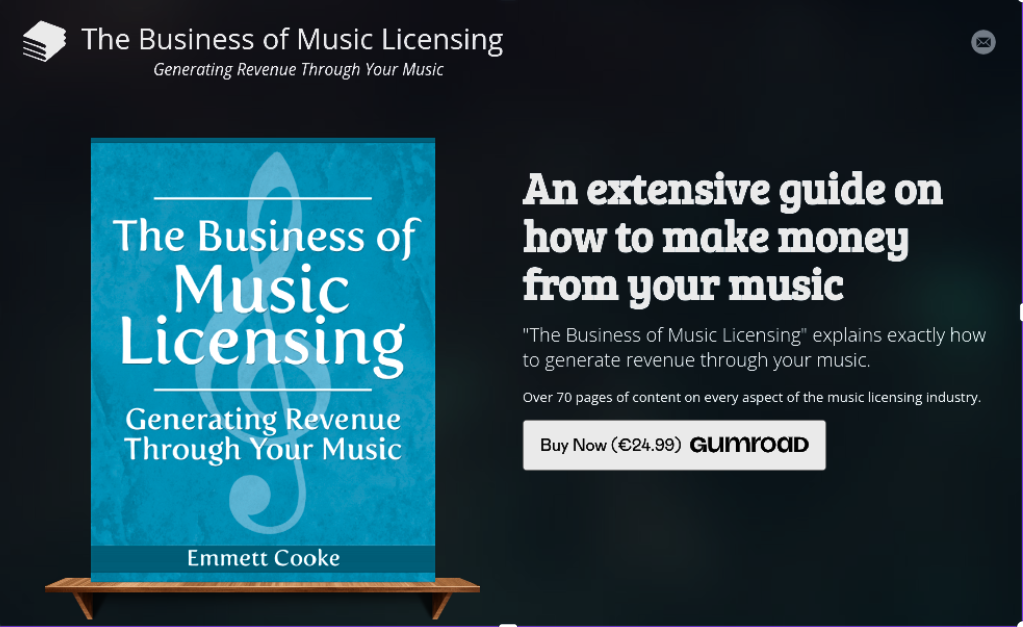

Emmet Cooke didn’t start his career in the music industry—he was answering phones in a call center, stuck in a job that felt worlds away from his true passion. But music had always been a part of him, and eventually he found his way into composing stock music. Over time, without even trying, he became a go-to expert in music licensing. It wasn’t a path he planned, but it’s the one that led to his biggest success.

Emmet took everything he’d learned and turned it into an eBook on music licensing. He wasn’t just teaching; he was sharing years of experience. With a little creativity and smart marketing, his eBook caught fire, earning him over $50,000 in passive income. It’s proof that when you follow your passion and package your expertise the right way, incredible things can happen.
The inception of Emmet Cooke's remarkable business is truly inspiring. Back in 2008, Emmet was working in a call center, providing tech support for AOL’s dial-up internet users—a job that was far from exciting. But when the call center shut down, it was the push he needed to pursue his real passion: music.
He began composing stock music, and soon, his work was being used in various client projects. As he learned more about the music licensing industry, Emmet became deeply involved in online communities, where he shared his growing expertise. People started noticing him as a knowledgeable source, frequently asking him for advice.
This recognition sparked an idea. Seeing how others were finding success with digital products, Emmet wondered if he could do the same by answering the questions he was always asked. And so, the concept for his eBook on music licensing was born—turning his passion and knowledge into a thriving business.

Like many new entrepreneurs, Emmet Cooke struggled with imposter syndrome and didn’t want to waste time on something nobody would buy. So, he came up with a simple but effective three-step validation plan to make sure his eBook idea had real potential.
First, he put together a mockup of the eBook and built a website with an email signup form through Launchrock. He listed the price and topics he’d cover, inviting people to subscribe if they were interested in learning more. Next, he reached out on social media, asking his followers what they wanted to see in the eBook and whether they’d actually buy it. He even offered them a discount for signing up early.
Lastly, Emmet went straight to the source—people who had already asked him for advice. He reached out personally to see if they’d be interested in a full guide on music licensing. Within just a week, over 300 people had signed up, eager for the book to drop.
With that kind of interest, Emmet knew he was onto something. Armed with confidence, he started creating the eBook, knowing there was a real audience waiting for it.
The success of Emmet Cooke’s eBook wasn’t just about creating a great product—it was also about clever marketing strategies that made a real impact.
During the pre-launch phase, Emmet kicked off a robust marketing campaign with a few key tactics:
Emmet crafted a strategic email plan for the eBook’s initial month. He contacted his subscribers, and once they made a purchase, he removed them from the list but kept following up with additional emails—after 5 days, a week later, and just before the launch ended. This strategy proved highly effective, driving nearly 50% of the initial sales.
Despite having a modest following, Emmet made the most of his social media presence by regularly posting updates about the eBook. This kept the buzz alive and drew attention from his audience.
Emmet’s early customers, who were particularly excited about the eBook, became enthusiastic advocates. Their positive word of mouth helped spread the news organically and brought in new readers.
Emmet also reached out to bloggers and reviewers in his niche, offering them review copies in exchange for coverage. This tactic helped extend his reach and build credibility in the industry.
These combined efforts created a strong launch for Emmet’s eBook, demonstrating how effective marketing can turn a great idea into a successful product.

Emmet Cooke’s eBook business makes money through the sale of his digital product. He started with a price of $9.99, then adjusted it to $14.99, and finally raised it to $24.99 based on feedback from readers.
In the first month alone, the eBook brought in over $10,000 at the introductory price. Throughout the year, the price increase led to an additional $15,000 in sales. Here’s how the numbers played out over four years:
Sales did decline each year, largely because of reduced marketing and growing competition. But Emmet’s story shows that with a solid product and effective early marketing, digital products can still bring in impressive revenue.
If you’re curious to dive deeper into Emmet Cooke’s journey and his successful eBook business, here are a couple of great resources: